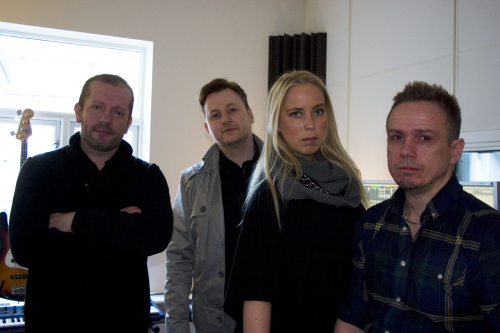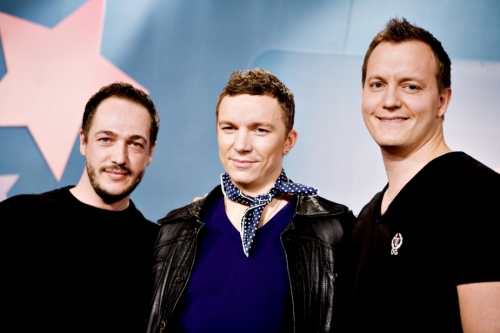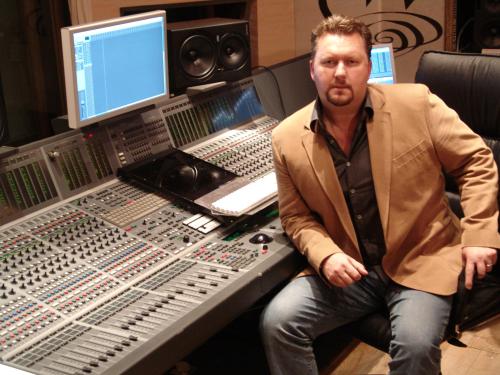뉴스속보 상세보기
SM searches abroad as overseas producers eye K-pop trends to keep hits coming
This is the final of a two-part series exploring the increasing involvement of foreign producers and composers in the K-pop scene. ― Ed.
With the K-pop market going increasingly global, the pressure is on to churn out an array of catchy and addictive tracks that feed the public’s increasingly selective appetite for music.
In response to heightened stakes, more and more South Korean entertainment companies are diversifying their portfolios by collaborating with overseas producers and composers.
Despite potential language and culture barriers, such teamwork has been nothing short of successful; as evidenced by SM Entertainment, which has generated collaborative hits like Girls’ Generation’s “Hoot,” “Run Devil Run” and “Genie.”
Part of the South Korean music giant’s steady success with such collaborations stems from the fact that it started to work with overseas talent as early as the late 1990s. In short, SM began drawing from a global pool of songwriters and producers right after its inception in 1995.
“As exemplified by our 1998 single ‘Dreams Come True’ from S.E.S.’ second album, we have been interacting with and bringing in songs from various composers and publishers throughout the world for a long time,” an SM Entertainment artists and repertoire publishing representative explained via e-mail.
Over the years SM Entertainment has built a strong network of connections in America and Europe, including what the representative calls a “close” relationship with Universal Music Publishing Group Sweden, the Stockholm-based office of one of the world’s biggest music publishing companies.
“We received a lot of songs from Universal Music Publishing Group, including Girls’ Generation’s ‘Genie,’” said the representative, referring to the hit single co-written by the Norway-based Dsign Music.
“I have for years delivered hit songs to SM’s roster of artists,” Universal Music Publishing Group European artists and repertoire executive Pelle Liddell explained via e-mail.
Liddell’s list of songs include BoA’s “Copy and Paste” and the popular single, “Hoot,” which was co-written by songwriter Alex James and the Denmark-based DEEKAY Music.
On SM’s side it certainly does not hurt to have a strong friendship with the office of a massive publishing group, especially when that group boasts industry know-how in spades and has a roster that includes major pop stars such as Christina Aguilera, Mariah Carey and Britney Spears.
One of the perks of such a relationship is the opportunity to participate in events like FantAsia, a songwriting camp that was held in Stockholm, Sweden, last year.
According to Liddell, Universal Music Publishing Sweden and affiliate The Kennel organized the event. SM flew in and for “four days all of our writers wrote exclusively for SM’s artists,” said Liddell.
“It was no longer just about requesting and pitching songs,” the SM representative said. “SM was able to give more detailed presentations about their artists and communicate with songwriters in person. Furthermore, it was an opportunity to create custom-made songs for SM”
One of those songs was BoA’s “Hurricane Venus,” a hit single worked on by “Genie”-collaborator Dsign Music at FantAsia.
There is no denying the benefits that come from having a group of 15 talented songwriters compose songs exclusively for one’s artists.
Not every South Korean entertainment company, however, is presented with such opportunities.
So how do most entertainment companies work with overseas talent?
According to Park So-young ― assistant manager of XP Media, the South Korean publishing arm of Xperimental Entertainment (a Los Angeles-based company founded by William Pyon and Kim Young-hu) ― music publishing companies select demos and give them to entertainment companies.
The entertainment company’s artists and repertoire team listen to and discuss the tracks they receive and then tell music publishing companies which songs they want, which ones they do not want, and which ones they want to put on hold.
Once a song is selected by an entertainment company, the music publishing company will send the instrumental version ― sans vocals ― to the entertainment company, so the company can tweak the song to suit their artists.
Usually, the entertainment company rewrites the song and adds vocals and lyrics themselves. According to Park, the whole process takes around four to six months if it is fast, but “there are instances where it can take up to or over three years.”
“Generally there is an extra fee for arranging a song, so the entertainment companies do it themselves,” Park explained why companies usually do not have the original composers or producers rewrite songs.
Aside from the possibility of additional expenses, there is also the need to write lyrics in Korean, a potential challenge for both entertainment companies and the overseas composers and producers who work with them.
“In K-pop you need to write melodies with more syllables because of the Korean language,” Dsign Music CEO Robin Jenssen said via e-mail. “The Korean artists and repertoire team really stress this fact when we are writing songs and it is absolutely crucial when they are going to do the adaptation of the song from English to Korean lyrics.”
Jenssen ― who co-founded Dsign with Anne Judith Wik, Nermin Harambasic and Ronny Svendsen in 2006 ― added that “we are very aware of the styles and trends of the Korean market and observe it very closely.”
What, then, are some key K-pop market trends?
XP Media’s Park thinks that it is “an idol market” so songs with “fast beats” are popular, while Xperimental CEO William Pyon, who not only worked with SM and YG Entertainment but also on projects featuring major artists such as the late 2Pac, says the guidelines include “very dancey, upbeat, catchy” melodic songs with a “hook phrase” and “a lot of changes.”
Grammy Award-winning producer Eliot Kennedy who worked on K-pop girl group Sistar’s “I Don’t Like Weak Men” pinpointed a possible trend toward music from “Scandinavian writers.”
“They’re already wising up to using European records,” Kennedy said in an interview with The Korea Herald.
Xperimental’s Pyon pointed to Swedish producer-and-songwriter Max Martin and team’s high profile work with Britney Spears as a potential impetus for such a trend.
Dsign’s Jenssen, who hails from Norway, believes that more South Korean acts might be turning to northern Europe because “We love to have fun, to dance and enjoy life” and therefore put out “catchy songs with danceable beats and a positive message.”
The SM representative stated that they do not have regional preferences when it comes to music.
The representative explained that they collaborate with overseas composers to “increase our chances of ‘finding a good song’ by listening to more tracks.’”
“I think that the chances of finding a great track are higher when picking from a pool of 100 versus 10 songs.”
By Jean Oh (oh_jean@heraldcorp.com)
This is the final of a two-part series exploring the increasing involvement of foreign producers and composers in the K-pop scene. ― Ed.
With the K-pop market going increasingly global, the pressure is on to churn out an array of catchy and addictive tracks that feed the public’s increasingly selective appetite for music.
In response to heightened stakes, more and more South Korean entertainment companies are diversifying their portfolios by collaborating with overseas producers and composers.
Despite potential language and culture barriers, such teamwork has been nothing short of successful; as evidenced by SM Entertainment, which has generated collaborative hits like Girls’ Generation’s “Hoot,” “Run Devil Run” and “Genie.”
Part of the South Korean music giant’s steady success with such collaborations stems from the fact that it started to work with overseas talent as early as the late 1990s. In short, SM began drawing from a global pool of songwriters and producers right after its inception in 1995.
“As exemplified by our 1998 single ‘Dreams Come True’ from S.E.S.’ second album, we have been interacting with and bringing in songs from various composers and publishers throughout the world for a long time,” an SM Entertainment artists and repertoire publishing representative explained via e-mail.
Over the years SM Entertainment has built a strong network of connections in America and Europe, including what the representative calls a “close” relationship with Universal Music Publishing Group Sweden, the Stockholm-based office of one of the world’s biggest music publishing companies.
“We received a lot of songs from Universal Music Publishing Group, including Girls’ Generation’s ‘Genie,’” said the representative, referring to the hit single co-written by the Norway-based Dsign Music.
 |
| Norway-based Dsign Music — (from left to right) founders Nermin Harambasic, Robin Jenssen, Anne Judith Wik and Ronny Svendsen (Dsign Music) |
“I have for years delivered hit songs to SM’s roster of artists,” Universal Music Publishing Group European artists and repertoire executive Pelle Liddell explained via e-mail.
Liddell’s list of songs include BoA’s “Copy and Paste” and the popular single, “Hoot,” which was co-written by songwriter Alex James and the Denmark-based DEEKAY Music.
On SM’s side it certainly does not hurt to have a strong friendship with the office of a massive publishing group, especially when that group boasts industry know-how in spades and has a roster that includes major pop stars such as Christina Aguilera, Mariah Carey and Britney Spears.
 |
Denmark based DEEKAY Music — founders Martin Michael Larsson (left) and Lars Halvor Jensen (right) with 2009 Dansk Melodi Grand Prix winner Niels Brinck (center). (Polfoto) |
One of the perks of such a relationship is the opportunity to participate in events like FantAsia, a songwriting camp that was held in Stockholm, Sweden, last year.
According to Liddell, Universal Music Publishing Sweden and affiliate The Kennel organized the event. SM flew in and for “four days all of our writers wrote exclusively for SM’s artists,” said Liddell.
“It was no longer just about requesting and pitching songs,” the SM representative said. “SM was able to give more detailed presentations about their artists and communicate with songwriters in person. Furthermore, it was an opportunity to create custom-made songs for SM”
One of those songs was BoA’s “Hurricane Venus,” a hit single worked on by “Genie”-collaborator Dsign Music at FantAsia.
There is no denying the benefits that come from having a group of 15 talented songwriters compose songs exclusively for one’s artists.
Not every South Korean entertainment company, however, is presented with such opportunities.
So how do most entertainment companies work with overseas talent?
According to Park So-young ― assistant manager of XP Media, the South Korean publishing arm of Xperimental Entertainment (a Los Angeles-based company founded by William Pyon and Kim Young-hu) ― music publishing companies select demos and give them to entertainment companies.
The entertainment company’s artists and repertoire team listen to and discuss the tracks they receive and then tell music publishing companies which songs they want, which ones they do not want, and which ones they want to put on hold.
Once a song is selected by an entertainment company, the music publishing company will send the instrumental version ― sans vocals ― to the entertainment company, so the company can tweak the song to suit their artists.
Usually, the entertainment company rewrites the song and adds vocals and lyrics themselves. According to Park, the whole process takes around four to six months if it is fast, but “there are instances where it can take up to or over three years.”
“Generally there is an extra fee for arranging a song, so the entertainment companies do it themselves,” Park explained why companies usually do not have the original composers or producers rewrite songs.
Aside from the possibility of additional expenses, there is also the need to write lyrics in Korean, a potential challenge for both entertainment companies and the overseas composers and producers who work with them.
“In K-pop you need to write melodies with more syllables because of the Korean language,” Dsign Music CEO Robin Jenssen said via e-mail. “The Korean artists and repertoire team really stress this fact when we are writing songs and it is absolutely crucial when they are going to do the adaptation of the song from English to Korean lyrics.”
Jenssen ― who co-founded Dsign with Anne Judith Wik, Nermin Harambasic and Ronny Svendsen in 2006 ― added that “we are very aware of the styles and trends of the Korean market and observe it very closely.”
What, then, are some key K-pop market trends?
XP Media’s Park thinks that it is “an idol market” so songs with “fast beats” are popular, while Xperimental CEO William Pyon, who not only worked with SM and YG Entertainment but also on projects featuring major artists such as the late 2Pac, says the guidelines include “very dancey, upbeat, catchy” melodic songs with a “hook phrase” and “a lot of changes.”
Grammy Award-winning producer Eliot Kennedy who worked on K-pop girl group Sistar’s “I Don’t Like Weak Men” pinpointed a possible trend toward music from “Scandinavian writers.”
 |
| Grammy Award-winning producer Eliot Kennedy |
“They’re already wising up to using European records,” Kennedy said in an interview with The Korea Herald.
Xperimental’s Pyon pointed to Swedish producer-and-songwriter Max Martin and team’s high profile work with Britney Spears as a potential impetus for such a trend.
Dsign’s Jenssen, who hails from Norway, believes that more South Korean acts might be turning to northern Europe because “We love to have fun, to dance and enjoy life” and therefore put out “catchy songs with danceable beats and a positive message.”
The SM representative stated that they do not have regional preferences when it comes to music.
The representative explained that they collaborate with overseas composers to “increase our chances of ‘finding a good song’ by listening to more tracks.’”
“I think that the chances of finding a great track are higher when picking from a pool of 100 versus 10 songs.”
By Jean Oh (oh_jean@heraldcorp.com)


